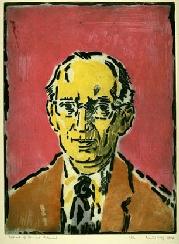|
Now linked to (Oct. 11, 1997):
American Literature on the Web
Top
Chronology 1
Chronology 2
End
 Portrait Portrait
 Life Life
 Art Art
 Critics Critics
 Barrel Barrel

You are visitor number
 since
March 1, 2000.
since
March 1, 2000.
 Portrait Gallery Portrait Gallery
 Self-Portrait of the Artist (1984) Self-Portrait of the Artist (1984)
 A Portrait of the Artist by Philip Roth A Portrait of the Artist by Philip Roth
 If you prefer the frame, click on The "Framed" UBMHP. If you prefer the frame, click on The "Framed" UBMHP.
|
Well, we were here, first-generation Americans, our language was English and a language is a spiritual mansion from which no one can evict us. Malamud in his novels and stories discovered a sort of communicative genius in the impoverished, harsh jargon of immigrant New York. He was a myth maker, a fabulist, a writer of exquisite parables. The English novelist Anthony Burgess said of him that he "never forgets that he is an American Jew, and he is at his best when posing the situation of a Jew in urban American society." "A remarkably consistent writer," he goes on, "who has never produced a mediocre novel .... He is devoid of either conventional piety or sentimentality ... always profoundly convincing." Let me add on my own behalf that the accent of hard-won and individual emotional truth is always heard in Malamud's words. He is a rich original of the first rank.
(Saul Bellow's eulogy, wrote for a memorial tribute to Malamud, 1986)
|
Top
Chronology 1
Chronology 2
End
Chronology of Bernard Malamud

- 1914
- Bernard Malamud is born in Brooklyn, New York, to Bertha and Max Malamud.
- 1928-32
- Attends Erasmus Hall High School.
- 1932-36
- Attends City College of New York; receives bachelor's degree in 1936.
- 1937-38
- Attends Columbia University.
- 1940-48
- Works as clerk in Bureau of Census, Washington, D.C.
- 1940-48
- Teaches evening classes at Erasmus Hall High School.
- 1941
- Begins writing short stories.
- 1942
- Receives Master's degree from Columbia University.
- 1943
- Publishes first stories: "Benefit Performance" in Threshold and "The Place Is Different Now" in American Preface.
- 1945
- Marries Ann de Chiara; lives in Greenwich Village.
- 1947
- A son, Paul, is born.
- 1948-49
- Teaches evening classes at Harlem Evening High School.
- 1949-61
- Teaches at Oregon State College, Corvallis, Oregon.
- 1950
- Stories appear in Harper's Bazaar, Partisan Review, Commentary.
- 1952
- The Natural is published. A daughter, Janna, is born.
- 1956-57
- Malamud receives a Partisan Review fellowship in fiction; lives in Rome and travels in Europe.
- 1957
- The Assistant is published.
- 1958
- The Magic Barrel is published. Malamud receives the Rosenthal Foundation Award of the National Institute of Arts and Letters for The Assistant.
- 1959
- Receives the National Book Award for The Magic Barrel. Receives a Ford Foundation Fellowship in humanities and the arts.
Top Chronology 1 Chronology 2 End
- 1961
- A New Life is published. Joins the faculty of Bennington College, Bennington, Vermont.
- 1963
- Idiots First is published. Travels in England and Italy.
- 1964
- Becomes a member of the National Institute of Arts and Letters.
- 1965
- Travels in the Soviet Union, France, and Spain.
- 1966-68
- The Fixer is published. Becomes visiting lecturer at Harvard University.
- 1967
- Wins the National Book Award and the Pulitzer Prize for The Fixer. Becomes a member of the American Academy of Arts and Sciences.
- 1968
- Visits Israel in March.
- 1969
- Pictures of Fidelman: An Exhibition is published.
- 1971
- The Tenants is published.
- 1973
- Rembrandt's Hat is published.
- 1979
- Dubin's Lives is published.
- 1982
- God's Grace is published.
- 1983
- The Stories of Bernard Malamud is published.
- 1986
- Malamud dies of heart attack.
- 1989
- The People and Uncollected Stories is published.
- 1997
- The Complete Stories is published.
- 2006
- My Father Is a Book, a memoir by his daughter Janna Malamud Smith, is published.
- 2007
- Bernard Malamud: A Writer's Life, the first comprehensive biography by Philip Davis, is published.
Top
Chronology 1
Chronology 2
End
|
 Portrait
Portrait
 Life
Life
 Art
Art
 Critics
Critics
 Barrel
Barrel

 Portrait Gallery
Portrait Gallery
 Self-Portrait of the Artist (1984)
Self-Portrait of the Artist (1984)
 A Portrait of the Artist by Philip Roth
A Portrait of the Artist by Philip Roth

